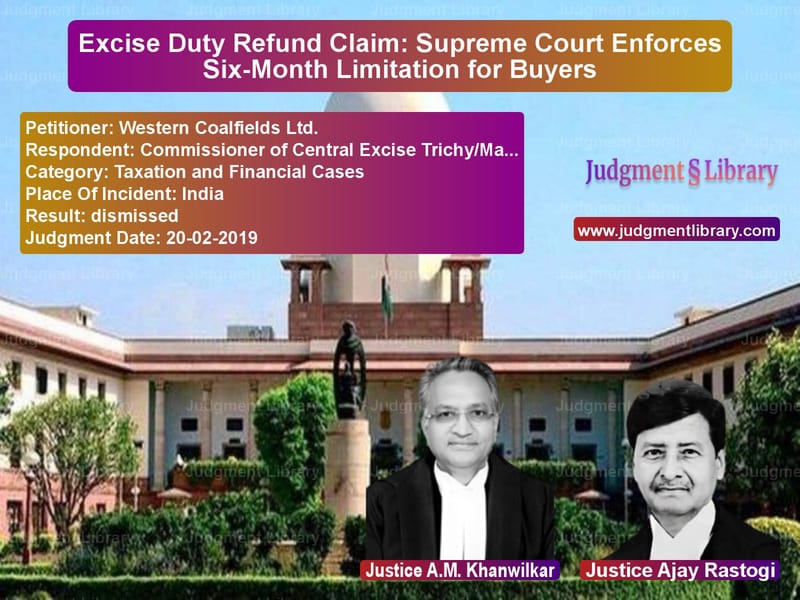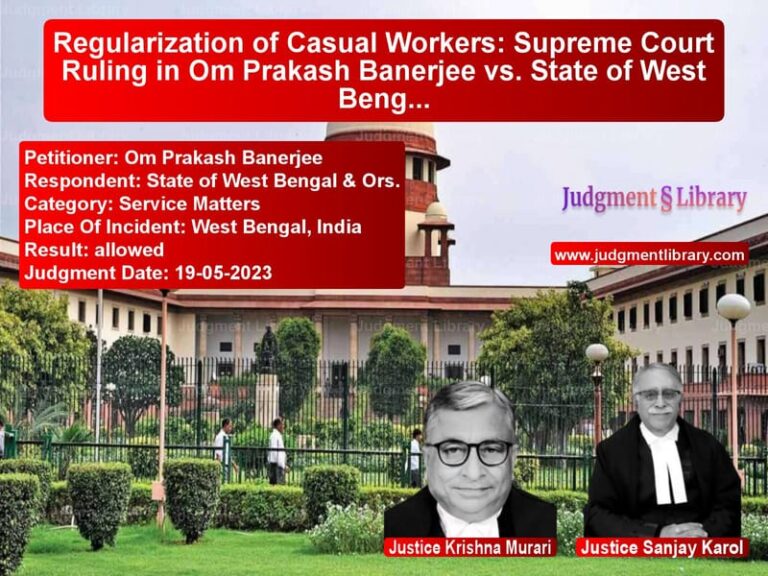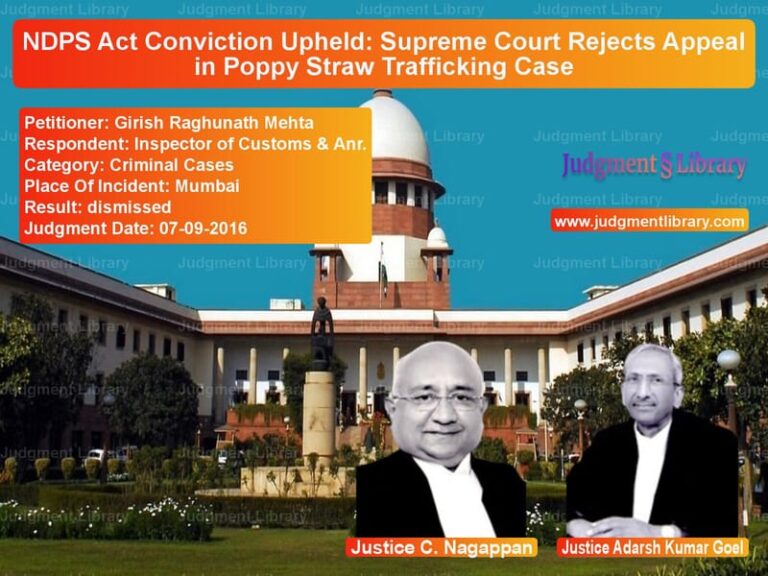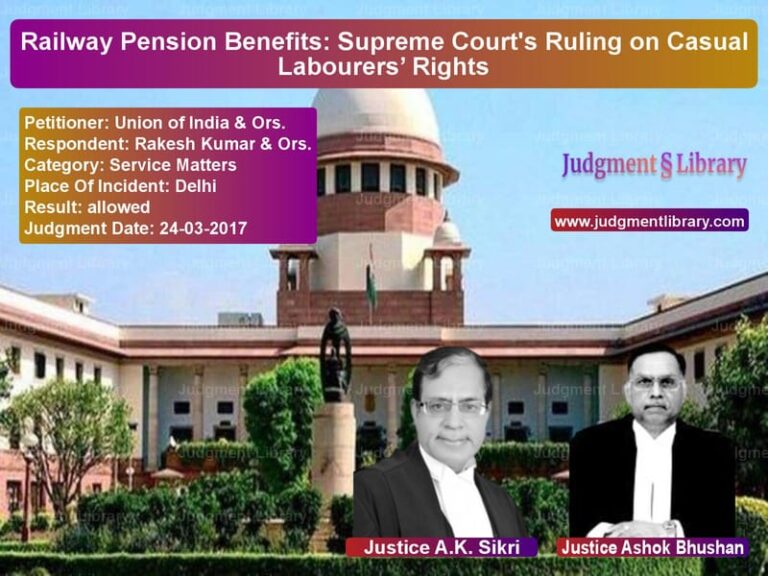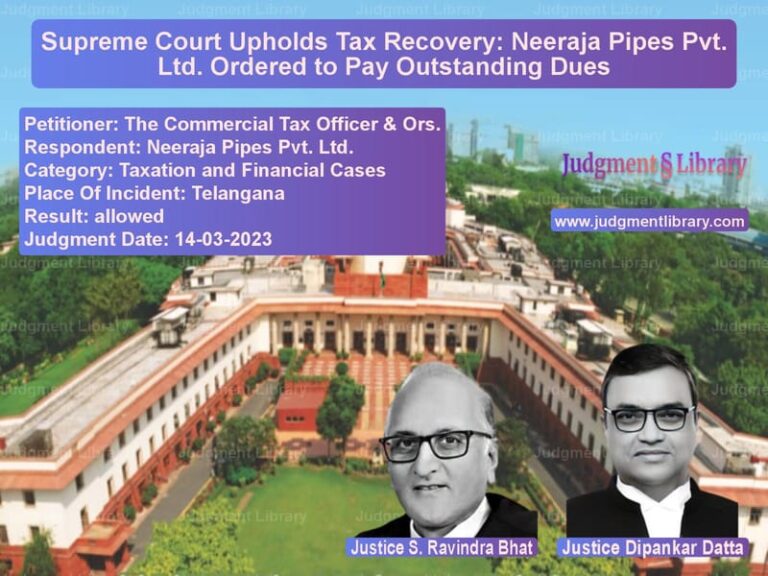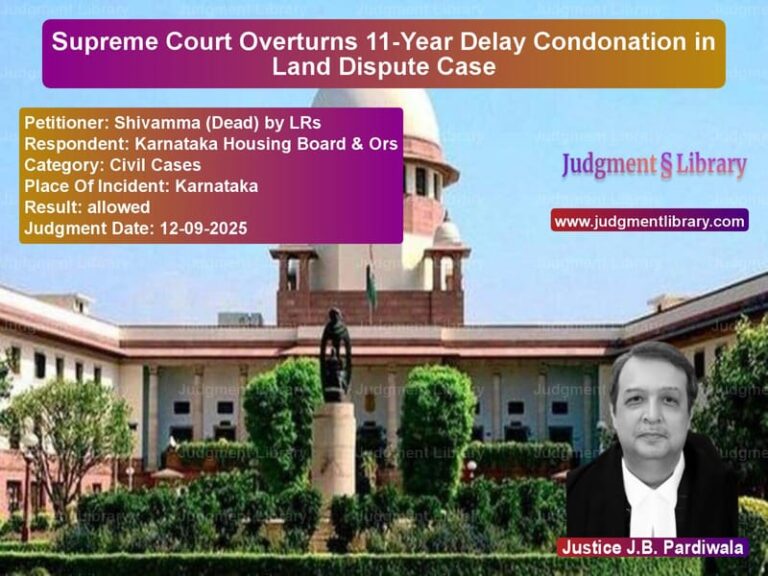Excise Duty Refund Claim: Supreme Court Enforces Six-Month Limitation for Buyers
The Supreme Court of India recently ruled in Western Coalfields Ltd. vs. Commissioner of Central Excise Trichy/Madurai, a case concerning the refund of excise duty under Section 11B of the Central Excise Act, 1944. The central issue was whether a buyer, who had paid excise duty indirectly through the manufacturer, could claim a refund beyond the six-month statutory limitation.
Background of the Case
Western Coalfields Ltd. (WCL), a government-owned coal mining company, purchased conveyor beltings from M/s. Fenner (India) Ltd. The manufacturer, under protest, paid excise duty on these products due to a dispute over their classification. The dispute was resolved in 1995 in favor of the manufacturer, confirming that the excise duty had been wrongly imposed.
Despite this ruling, M/s. Fenner (India) Ltd. never sought a refund for the excise duty paid under protest. Instead, Western Coalfields Ltd., as the buyer, filed a refund claim on December 20, 1996, seeking reimbursement for purchases made between July 20, 1988, and January 15, 1994. The claim was rejected on the ground that it was time-barred under Section 11B of the Central Excise Act.
Key Issues Before the Supreme Court
- Does the six-month limitation under Section 11B apply to buyers seeking an excise duty refund?
- Can the buyer’s claim be considered valid if the manufacturer paid duty under protest?
- Did the Tribunal err in rejecting the refund application based on limitation?
Petitioner’s (Western Coalfields Ltd.) Arguments
- Since the manufacturer had paid excise duty under protest, the limitation period should not apply to the buyer’s refund claim.
- As the actual bearer of the excise duty, WCL was entitled to a refund, and procedural barriers should not deny its rightful claim.
- The payment of duty under protest should allow an extension of time for filing a refund claim.
- The principle of unjust enrichment did not apply as the company had not passed on the duty to consumers.
Respondent’s (Commissioner of Central Excise) Arguments
- Under the Central Excise Act, manufacturers and buyers are distinct entities, and each must independently comply with the six-month limitation under Section 11B.
- The manufacturer never applied for a refund, and thus, the buyer had no standing to extend the timeline.
- Buyers must file refund claims within six months from the date of purchase, and this period cannot be extended based on the manufacturer’s protest.
- The Tribunal had correctly applied the ruling in Commissioner of Central Excise, Mumbai-II vs. Allied Photographics India Ltd., which held that buyers must comply with the statutory limitation period.
Supreme Court’s Observations
The Supreme Court analyzed the relevant provisions of the Central Excise Act and ruled in favor of the Commissioner of Central Excise. The Court made key observations:
“The scheme of Section 11B makes a distinction between the right of the manufacturer to claim a refund and the right of the buyer to claim a refund, treating them as separate and distinct entities.”
“The buyer must file a refund application within six months from the date of purchase of the goods. The fact that the manufacturer paid the duty under protest does not extend the limitation period for the buyer.”
“The Tribunal correctly applied the ruling in Commissioner of Central Excise, Mumbai-II vs. Allied Photographics India Ltd., where it was held that the buyer’s refund claim must comply with the statutory limitation period.”
Key Findings of the Supreme Court
- The refund claim filed by Western Coalfields Ltd. was time-barred under Section 11B of the Central Excise Act.
- The manufacturer and the buyer are treated separately in excise duty refunds, and the buyer cannot claim an exemption from the limitation period based on the manufacturer’s protest.
- The buyer must file for a refund within six months from the date of purchase, failing which the claim becomes ineligible.
- The ruling reaffirmed the principle that compliance with statutory deadlines is mandatory for refund claims.
Impact of the Judgment
This ruling has significant implications for refund claims under the Central Excise Act:
- It establishes that the six-month limitation period applies independently to buyers and manufacturers.
- It reinforces the requirement for buyers to file refund claims within six months of purchase, irrespective of whether the manufacturer paid duty under protest.
- It clarifies that manufacturers and buyers are distinct entities under the law, and procedural compliance is necessary for refunds.
Conclusion
The Supreme Court’s judgment in Western Coalfields Ltd. vs. Commissioner of Central Excise Trichy/Madurai reaffirms the principle that refund claims must adhere to statutory timelines. By rejecting the buyer’s argument that the manufacturer’s protest should extend the limitation period, the Court upheld the mandatory six-month period under Section 11B. This ruling serves as a precedent for future cases involving excise duty refunds and reinforces the importance of timely compliance with legal procedures.
Petitioner Name: Western Coalfields Ltd..Respondent Name: Commissioner of Central Excise Trichy/Madurai.Judgment By: Justice A.M. Khanwilkar, Justice Ajay Rastogi.Place Of Incident: India.Judgment Date: 20-02-2019.
Don’t miss out on the full details! Download the complete judgment in PDF format below and gain valuable insights instantly!
Download Judgment: Western Coalfields L vs Commissioner of Cent Supreme Court of India Judgment Dated 20-02-2019.pdf
Direct Downlaod Judgment: Direct downlaod this Judgment
See all petitions in Tax Refund Disputes
See all petitions in Income Tax Disputes
See all petitions in Customs and Excise
See all petitions in Judgment by A M Khanwilkar
See all petitions in Judgment by Ajay Rastogi
See all petitions in dismissed
See all petitions in supreme court of India judgments February 2019
See all petitions in 2019 judgments
See all posts in Taxation and Financial Cases Category
See all allowed petitions in Taxation and Financial Cases Category
See all Dismissed petitions in Taxation and Financial Cases Category
See all partially allowed petitions in Taxation and Financial Cases Category

